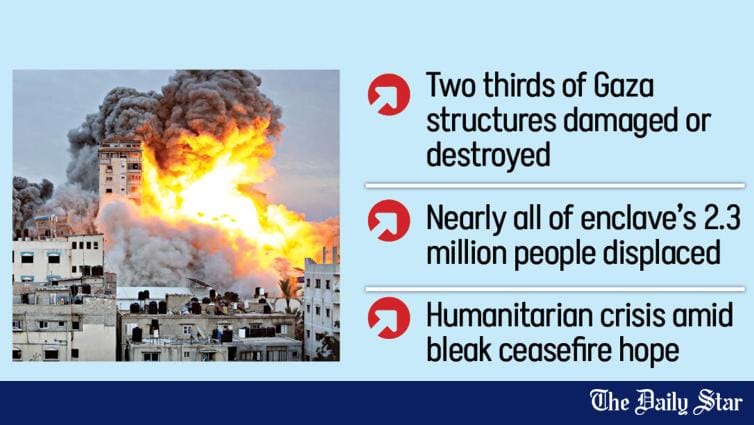Saif
Senior Member
- Joined
- Jan 24, 2024
- Messages
- 16,880
- Likes
- 8,153
- Nation

- Residence

- Axis Group


Two-thirds of Gaza buildings damaged in war: UN
The last assessment, based on images from early July, determined that 63 per cent of structures in the Palestinian territory had been damaged
Two-thirds of Gaza buildings damaged in war: UN
Updating its damage assessment, the UN Satellite Centre (UNOSAT) said very high-resolution imagery collected on 3 and 6 September showed a clear deterioration
AFP
Geneva
Published: 30 Sep 2024, 20: 35

A woman sorts through clothing salvaged from the rubble of a destroyed dress shop in a residential building hit by Israeli bombardment, in the Daraj neighborhood in Gaza City on 14 June, 2024, amid the ongoing conflict between Israel and Hamas AFP
Two-thirds of the buildings in the Gaza Strip have been damaged or destroyed since the Gaza war began in October 2023, the United Nations said on Monday.
Updating its damage assessment, the UN Satellite Centre (UNOSAT) said very high-resolution imagery collected on 3 and 6 September showed a clear deterioration.
“This analysis... shows that two-thirds of the total structures in the Gaza Strip have sustained damage,” UNOSAT said.
“Those 66 per cent of damaged buildings in the Gaza Strip account for 163,778 structures in total,” it said.
The last assessment, based on images from early July, determined that 63 per cent of structures in the Palestinian territory had been damaged.
Monday’s update said the damage now included “52,564 structures that have been destroyed; 18,913 severely damaged; 35,591 possibly damaged structures; and 56,710 moderately affected”.
Gaza City has been notably affected, with 36,611 structures destroyed, it added.
UNOSAT and the UN’s Food and Agriculture Organization said that approximately 68 per cent of the permanent crop fields in the Gaza Strip showed “a significant decline in health and density” in September.
Hamas’s unprecedented 7 October attack on Israel resulted in the deaths of 1,205 people, mostly civilians, according to an AFP tally based on Israeli official figures that include hostages killed in captivity.
Israel’s retaliatory military offensive has killed at least 41,615 people in Gaza, most of them civilians, according to figures provided by the Hamas-run territory’s health ministry. The UN has described the figures as reliable.
Part of the UN Institute for Training and Research (UNITAR), Geneva-based UNOSAT says its satellite imagery analysis helps the humanitarian community assess the extent of conflict-related damage and helps shape emergency relief efforts.
“Over the past year, UNOSAT’s team has worked tirelessly to provide the world with precise and timely insights into the impact of the conflict on buildings and infrastructure in Gaza,” said UNITAR’s executive director Nikhil Seth.
Updating its damage assessment, the UN Satellite Centre (UNOSAT) said very high-resolution imagery collected on 3 and 6 September showed a clear deterioration
AFP
Geneva
Published: 30 Sep 2024, 20: 35
A woman sorts through clothing salvaged from the rubble of a destroyed dress shop in a residential building hit by Israeli bombardment, in the Daraj neighborhood in Gaza City on 14 June, 2024, amid the ongoing conflict between Israel and Hamas AFP
Two-thirds of the buildings in the Gaza Strip have been damaged or destroyed since the Gaza war began in October 2023, the United Nations said on Monday.
Updating its damage assessment, the UN Satellite Centre (UNOSAT) said very high-resolution imagery collected on 3 and 6 September showed a clear deterioration.
“This analysis... shows that two-thirds of the total structures in the Gaza Strip have sustained damage,” UNOSAT said.
“Those 66 per cent of damaged buildings in the Gaza Strip account for 163,778 structures in total,” it said.
The last assessment, based on images from early July, determined that 63 per cent of structures in the Palestinian territory had been damaged.
Monday’s update said the damage now included “52,564 structures that have been destroyed; 18,913 severely damaged; 35,591 possibly damaged structures; and 56,710 moderately affected”.
Gaza City has been notably affected, with 36,611 structures destroyed, it added.
UNOSAT and the UN’s Food and Agriculture Organization said that approximately 68 per cent of the permanent crop fields in the Gaza Strip showed “a significant decline in health and density” in September.
Hamas’s unprecedented 7 October attack on Israel resulted in the deaths of 1,205 people, mostly civilians, according to an AFP tally based on Israeli official figures that include hostages killed in captivity.
Israel’s retaliatory military offensive has killed at least 41,615 people in Gaza, most of them civilians, according to figures provided by the Hamas-run territory’s health ministry. The UN has described the figures as reliable.
Part of the UN Institute for Training and Research (UNITAR), Geneva-based UNOSAT says its satellite imagery analysis helps the humanitarian community assess the extent of conflict-related damage and helps shape emergency relief efforts.
“Over the past year, UNOSAT’s team has worked tirelessly to provide the world with precise and timely insights into the impact of the conflict on buildings and infrastructure in Gaza,” said UNITAR’s executive director Nikhil Seth.




